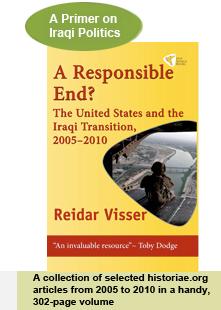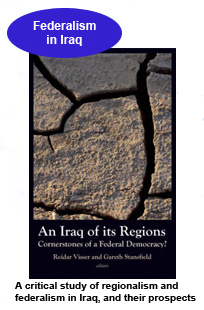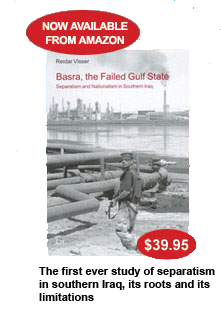



| Main | |
| Documents & images | |
| Links | |
| Contact | |
 | |
| amazon.com |

|
|
|
amazon.com
amazon.co.uk |
|

|
|
|
amazon.com
amazon.co.uk |
|
The Provincial Elections: The Seat Allocation Is Official and the Coalition-Forming Process Begins
By Reidar Visser (www.historiae.org)
19 February 2009
After today’s official release by the Iraqi elections commission of the seat allocation in the new Iraqi provincial councils elected on 31 January, the process of forming new coalitions can begin in earnest. Since the provisional result was released two weeks ago, the various parties have had some time to calculate their likely share of the seats and initiate a process of negotiation with prospective partners, but small percentage differences can have dramatic implications for the mathematics of coalitions and hence the exact political landscape only became apparent today.
One general aspect of the results that will now become painfully clear to voters is that the modified Iraqi elections system – once hailed as an improvement on the previous one in that voters would have a greater impact on the ranking of individual candidates – remains heavily biased in favour of the bigger, established entities. Among other things, the counting rules – highlighted as a potential problem by some Western analysts such as Sam Parker of the United States Institute of Peace – mean that lists fielding a large number of candidates will have comparative advantages in the battle for the last remaining seats, whereas on the opposite end of the spectrum, votes for one-person entities will have been wasted once a single seat has been secured. In general, this framework of disincentives for voting for smaller entities and one-party lists has been bluntly ignored by the Iraqi electorate, with the result that they today found out that a very high proportion of their votes might as well have been thrown directly in the dustbin. The most spectacular case is of course Karbala, where Yusuf al-Habubi’s one seat is by far the priciest one of the election, coming on the strength of no less than 13% of the popular vote. In areas from Baghdad and southwards more generally, the gains in number of seats by Daawa as a result of the system are quite dramatic, leaving them with an outright majority in Basra, and very close to majority in Wasit and Baghdad. Additionally, huge sectors of the electorate will realise that their votes were wasted in the sense that they yielded nothing to a seat-winning candidate. With the exception of the big constituency in Baghdad, this involves percentages for “unrepresented” voters ranging between 30 in Basra to as much as 60 in Hilla.
Governorate
|
Daawa percentage of votes |
Daawa Percentage of seats |
“Unrepresented” percentage |
Basra |
37 |
57 |
32 |
Maysan |
18 |
30 |
41 |
Dhi Qar |
23 |
41 |
36 |
Muthanna |
11 |
19 |
45 |
Qadisiyya |
23 |
39 |
35 |
Babel |
13 |
27 |
59 |
Wasit |
15 |
46 |
60 |
Najaf |
16 |
25 |
39 |
Karbala |
9 |
33 |
57 |
Baghdad |
38 |
49 |
20 |
ISCI, too, has benefitted somewhat during this process. Still, a comparison with 2005 underlines the extent to which the Daawa coalition has replaced ISCI as the dominant force across the Shiite-majority governorates:
Governorate
|
Daawa percentage of seats 2009 |
ISCI percentage of seats 2009 |
ISCI percentage of seats 2005 |
Basra |
57 |
14 |
49 |
Maysan |
30 |
30 |
15 |
Dhi Qar |
41 |
16 |
24 |
Samawa |
19 |
19 |
20 |
Diwaniyya |
39 |
18 |
49 |
Hilla |
27 |
17 |
61 (coalition) |
Wasit |
46 |
21 |
75 (grand coalition) |
Najaf |
25 |
25 |
46 |
Karbala |
33 |
15 |
31 (coalition) |
In general, compared with the provisional result, the seat allocation has served to produce a more stereotypic political landscape in the south, with Daawa in the lead, followed by ISCI and Sadrist as competitors for the second biggest chunk of votes, then followed by Jaafari and then Wifaq and/or some kind of local phenomenon – by which is meant both lists that have a genuine local character (such as The Justice and Unity Association in Basra or the Hope of Mesopotamia in Karbala) as well as lists that have been reduced to local phenomena against their own will (such as Fadila which won seats only in Basra, Dhi Qar and Qadisiyya).
Governorate; total number of seats |
Maliki |
ISCI |
Sadrist |
Jaafari |
Wifaq and other nation-wide secularist parties |
Local phenomena including minorities seats |
Basra (35) |
20 |
5 |
2 |
|
2 |
2+2+1+1 |
Maysan (27) |
8 |
8 |
7 |
4 |
|
|
Dhi Qar (31) |
13 |
5 |
7 |
4 |
|
2 |
Muthanna (26) |
5 |
5 |
2 |
3 |
|
3+2+2+2+2 |
Wasit (28) |
13 |
6 |
3 |
|
3 |
3 |
Qadisiyya (28) |
11 |
5 |
2 |
3 |
3 |
2+2 |
Babel (30) |
8 |
5 |
3 |
3 |
3 |
3+3+2 |
Najaf (28) |
7 |
7 |
6 |
2 |
|
4+2 |
Karbala (27) |
9 |
4 |
4 |
|
|
9+1 |
Baghdad (57) |
28 |
3 |
5 |
3 |
5+4 |
7+1+1 |
The new councils will meet within 15 days to elect their new officials, and new coalitions will have to be formed in this period. Precisely because of the relatively homogenous political map now after the seat allocation, the ongoing negotiations among party elites in Baghdad could have enormous significance. By way of example, a deal between Maliki and the Sadrists would give the Daawa coalition control of Maysan, Dhi Qar, Wasit and Baghdad. (In theory, Maliki could achieve the same, plus Qadisiyya and Najaf by turning to Hakim and ISCI, but would then have to reverse several months of intense disagreement.) Adding Ibrahim al-Jaafari to his coalition alongside the Sadrists would give Maliki control of Qadisiyya and Najaf as well. This leaves a group of highly fragmented Middle Euphrates governorates where ISCI was once strong: Babel and Muthanna, plus the interesting case of Karbala, where the two “local phenomena”, Yusuf al-Habubi and the Hope of Mesopotamia list, seem to be looking to Daawa and ISCI respectively as potential coalition partners. But whereas the Hope of Mesopotamia list is a significant bloc with 9 seats, Habubi has only one seat and Maliki would need the Sadrists in addition to gain a majority here.
One of the biggest questions now is whether there will be moves towards ideological or opportunistic alliances. Maliki has a golden opportunity to realign himself with opposition parties that share much of his ideology when it comes to centralism and state structure, such as the Sadrists, Fadila and Wifaq and other secularists. But there are also other tendencies at work. Recently, the secular Iyad Allawi has apparently been in dialogue with ISCI, and the heavily-decimated Fadila party has hinted at the possible reconstitution of the (Shiite-led) United Iraqi Alliance. These are both examples of moves that would negate the declared aim of these parties to move away from a political system of ethno-sectarian quota-sharing (is Allawi hoping for a quota for “secularists”?!) and would reverse the positive trends towards greater emphasis on issues and ideology in the latest local elections.
Copyright © 2005-2008 historiae.org & Reidar Visser
This document or quotes from it may be freely reproduced as long as www.historiae.org is credited as the original source.
